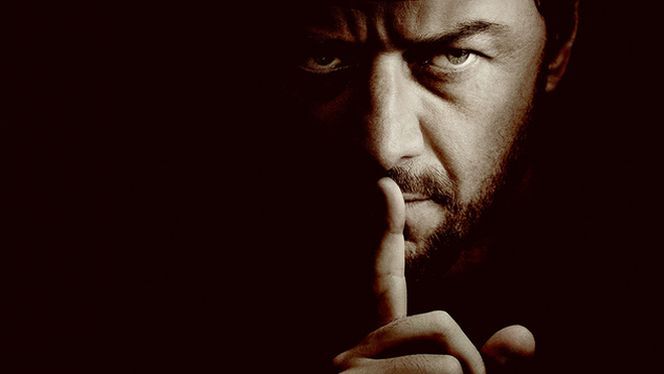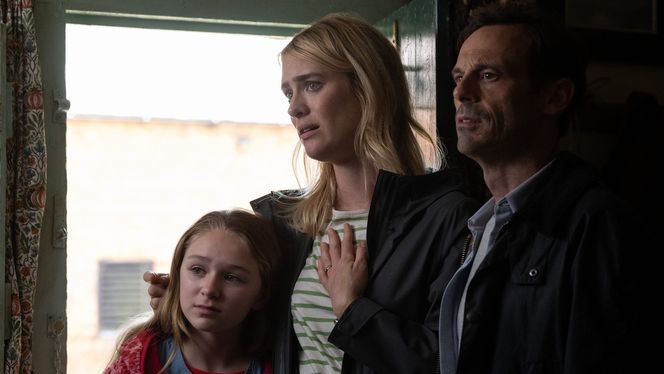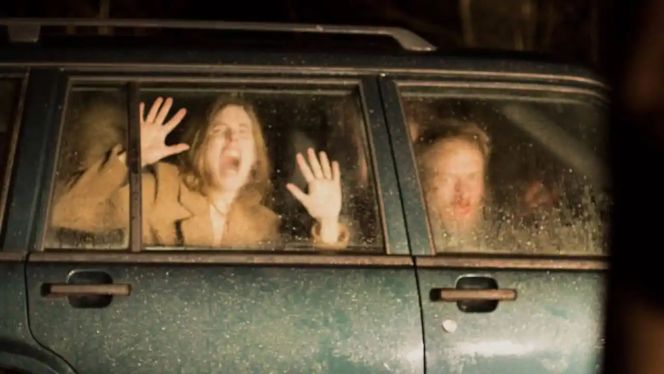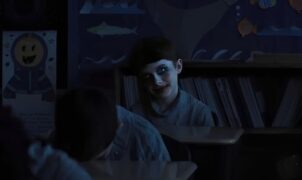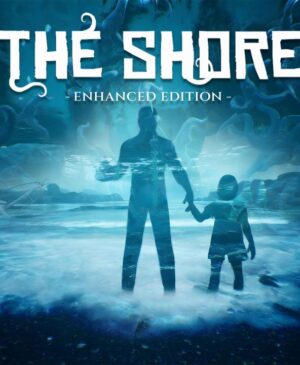MOVIE PREVIEW – When an American family is invited to spend the weekend at the idyllic farmhouse of a charming British family they befriended on vacation, what begins as a dream holiday soon warps into a snarled psychological nightmare. From Blumhouse, the producer of The Black Phone, Get Out and The Invisible Man, comes an intense suspense thriller for our modern age, starring BAFTA award-winner James McAvoy (Split, Glass) in a riveting performance as the charismatic, alpha-male host whose untrammeled hospitality masks an unspeakable darkness.
For almost two decades now, Blumhouse has thrilled audiences—and scared the hell out of them—with fresh takes on paranormal activity and every form of evil under the sun (and several full moons, too). But it has also expanded the boundaries of the horror genre with films that have turned the tensions and rituals of everyday life into provocative, topical, wickedly impish entertainment, from Get Out, Jordan Peele’s ingeniously freaky fable about racism in America, to the riotous social satire of The Purge franchise. Now, from writer-director James Watkins comes a twisted take on a British comedy of manners, in which one family’s trip into the countryside to visit some new friends goes horrifically awry, escalating from an awkward social ordeal that challenges their notions of politeness into a shocking nightmare in which they must abandon all civility and fight for their survival.
Typically British, Grand Guignol horror comedy
Speak No Evil is based upon the screenplay of the 2022 Danish thriller, Gaesterne (“The Guests” in Danish). “A couple of years back, I got a call from an executive at Universal who had just seen a film at Sundance that got completely under his skin,” producer Jason Blum says. “I’m always glad to be the guy who gets the call when someone sees something disturbing— if it ruins your day, call me!— so I arranged to see it and I was floored. As it unfolded, I recoiled with each new revelation, and when it was over, I couldn’t shake it. I believed that in the right hands, an English language reinterpretation could be a very memorable, very unsettling, very special film.”
It needed just the right filmmaker, though. Blum had been a huge fan of Watkins’ films Eden Lake and The Woman in Black and thought Watkins might be the ideal fit. He was right. When Watkins saw the Danish film, he immediately connected with the material and saw rich potential in an adaptation. “I loved the sly and relatable conceit: people on holiday questioning the direction of their lives and befriending a couple who they think might hold the answers,” Watkins says. “The film really hooked me on a thematic level: its exploration of how modern society shackles us with rules and how we struggle to negotiate them.”
It was exactly the kind of movie that stirs Watkins’s intellect and imagination. “I started my career with a horror-thriller called Eden Lake,” Watkins says. “You’d maybe call it a ‘social horror,’ exploring intergenerational conflict, class fears and cycles of violence in society. I wanted to get back to that intersection of genre and ideas, and this story afforded a chance to have that sort of intelligent fun.”
Watkins’ screenplay resonated with the film’s producers, on more than just a cinematic level. “James has a great sense of story and narrative,” says producer Paul Ritchie, who first worked with Watkins almost 20 years ago on Eden Lake. “He knows the characters inside and out and his impeccable sense of timing and his awareness of the audience experience make him perfectly suited for a film of this ilk.”
Watkins’ screenplay tapped into the universal, every-day relatability of the story’s premise. “James was the perfect choice to write and direct Speak No Evil because he excels at grounded horror, the horror that can happen to anyone,” says executive producer Beatriz Sequeira, who oversaw the production of Speak No Evil on behalf of Blumhouse. “We were all big fans of Eden Lake and so impressed with his ability to create relationships between characters and make even the most innocent of domestic scenes feel like the tensest situation you’ve ever been in your life. The first time I read James’s script, I remembered these friends that I met while I was on vacation in Fiji who were from New Zealand, where they lived on a cattle farm. I used to think it would be fun to visit them there and get to know them better. But the first thought I had after I had read the script was: ‘That’s not happening anymore.’ That’s how much it scared me.”
A couple in crisis
Watkins’s screenplay centers on Ben and Louise Dalton, Americans living in England, each grappling with identity crises, both growing distant from each other. Materially comfortable yet miserable, they persist in their struggling marriage to raise their daughter, Agnes, an anxious pre-teen who goes nowhere without the unofficial fourth member of the family, Hoppy, her stuffed animal “comfort bunny.”
The Daltons languishing life takes a turn when they meet Paddy, an earthy, charismatic force of nature, his devoted wife, Ciara, and their son, Ant, while on holiday in Tuscany. Ben and Louise are charmed by Paddy’s gregarious personality and Ciara’s warmth.
As camaraderie blooms between the families, the Daltons (and especially Ben) start to see their free-spirited new friends as possible role models to fix their marriage. So it goes that, weeks later, when Paddy and Ciara invite the Daltons to along weekend on their farm in rural England, Ben talks Louise into accepting. In Ben’s mind, “this could be good for us,” he tells her. It could be a literal breath of fresh air, with rugged country living – hunting, hiking, working the land – offering them a chance to reboot and reset. And it offers Ben a chance to be a different kind of person and indulge a certain kind of hyper-masculine, super-libertarian fantasy. But once they get to Paddy and Ciara’s remote, secluded farmstead, far away from anyone and everything they know, Ben, Louise and Agnes discover that who Paddy and Ciara and Ant are on holiday isn’t exactly who they are at home, and that Paddy’s interest in Ben, Louise and Agnes has never been friendly.
“The Daltons, particularly Ben, have been ground down by life, or at least, their lives don’t match up to the packaged perfect lives they are daily told they should be living by the feeds on their devices,” Watkins says. “‘Affluenza’ used to be the term – people who have lots of material things but are still struggling emotionally. Ben is particularly troubled. He feels that he’s past his prime, on the scrapheap. He’s not sure how to negotiate the modern world and its new codes. Paddy opens a door for Ben that makes him wonder: is there a better way of living? But when they visit the farm so Ben can live out these fantasies of rural authenticity, things aren’t quite what they imagined. The film becomes a kind of ‘check your privilege’ morality tale: Be careful what you wish for when you are complacent about your security and comforts, when you’re feeling trapped by ‘social norms’ and when you want to loosen up and find your animal self. You may think you want danger. But when real danger comes, do you even know how to deal with it?”
Ben captures many of the film’s conflicts regarding identity, but the captivating center of the story is the character who initially presents as the solution to them. In the character of Paddy, Watkins saw an opportunity to comment on the rise of toxic masculinity and personality-cult demagogues. “I wanted to explore a modern crisis in identity, that sense of disenfranchisement that leaves people—mainly men—open to bad mentors like Paddy, who reject all the rules, who promise to ‘take back control,’ who reject the packaged and the polite in favor of some notion of ‘authenticity’,” Watkins says. “I wanted the audience to slightly fall under Paddy’s spell in the way that Ben and Louise do and show how easy it is for a ‘normal’ man like Ben—who has fragilities but is by no means an extremist or an oddball—to buy into this dream and thus become complicit in the shitstorm that it creates. As Paddy says, when Ben and Louise ask him why he’s doing what he’s doing to them: Because you let us.”
They avoided horror clichés
While Speak No Evil builds on many of the themes of Gaesterne, it deviates from its inspiration in significant ways, starting with the cultural identities of its main characters. Instead of being Danish, the protagonists are Americans, and instead of being Dutch, the villains are English. “I didn’t want to do a rote American horror take,” Watkins says. “You know the type: fish-out-of-water New Yorkers visit their ‘unvarnished’ new friends in West Virginia …. I felt that there was a very British angle to the characterization and humor where I could bring more specificity and honesty, to mine things closer to home and give the satire more bite.”
Creating a collision between this American couple from the big city with modern values and a British couple from the country with more traditional values allowed Watkins to heighten the tension and make the Daltons (and by extension, the audience) question their perceptions of Paddy and Ciara’s behavior. *“The culture clash adds to the confusion at play
in the film’s interest in manners, competing or changing norms, and how we read social signals,” Watkins says. “For Ben and Louise, are Paddy and Ciara weird or are they just quirky English eccentrics?! Is their house shabby chic or just shabby? There’s a further irony in that the movie inverts the stereotypes of Brits and Americans. Often, Brits are presented as repressed and Americans as more direct and plain-speaking. That’s always been a simplistic cliché; there’s always been a particular type of Brit like Paddy who is outspoken—and a particular type of American who is quite repressed—and a strain of British humor that revels in saying the unsayable, things Americans would never say. Regardless, I felt all these cross-national confusions would be a rich ingredient in the stew of social anxiety I wanted to cook.”
The other critical change that Watkins made was a new third act that resolves the conflict between Paddy and the Dalton family in a profoundly different way. “I loved the nihilist slap in the face in the third act of Christian’s movie, but I saw an opportunity to further explore the choices and agency of the main characters,” Watkins says. “When the veneer of politeness breaks, what do they do? Can the rules of society be shown as a strength as well as a weakness: could we turn from politeness-as-a-trap to politeness-as-a-means of escape? And when conflict explodes into the open, what then? In real life, very few of us are equipped with how to deal with conflict, with overt aggression. So how do normal people confront this abnormal situation? At what point do our primal needs overcome society’s shackles? At what point do Ben and Louise overcome their reticence and fight back or flee? Can Ben and Louise ultimately reject Paddy’s world view?”
Exploring these questions helped give the Daltons some options for action without subverting the film’s naturalistic grit and sociopolitical bite. “I wanted to give my characters more agency, but I didn’t want them suddenly to become action heroes,” Watkins says. “I hate it when ‘normal people’ suddenly start acting like Navy Seal ninjas in the third act. I want to keep things messy and chaotic and full of fear. I very deliberately wanted to challenge lazy gender stereotypes: for Louise to be more proactive in the final act, even more ‘alpha’ than Ben. And I wanted the notions of character that had been set up to track through and be stress-tested. I wanted Ben to have to confront the false binary of masculinity—raw caveman strength versus modern “liberal” weakness—that Paddy thrusts upon him, and I wanted to lean even further into the themes of toxic masculinity and how violence breeds violence through generations.’”
As Watkins fine-tuned his vision and entered production, he found further inspiration in the films of lauded filmmakers Michael Haneke and Ruben Östlund, and from Mike Nichols’ The Graduate, Sam Peckinpah’s Straw Dogs, John Boorman’s Deliverance and Mike White’s Emmy-winning series The White Lotus. “In my head, Speak No Evil was always a psychological thriller with a horrific core,” Watkins says. “This subtle distinction is important in terms of my approach. The tension hopefully blooms from the psychological exploration of each character and how they interact in a modern social setting. All the films that informed this approach peel away the layers of ‘civilized’ life to revel in the power struggles of social interaction and explore the barely suppressed rage polite smiling people feel towards each other. White Lotus recently did this brilliantly, and I love the ‘dramedy’ of Mike White’s work, how his scenes veer between comedy and drama in the way they milk the horrors of every social interaction between the characters.”
With the screenplay completed, the production of Speak No Evil quickly kicked into high gear in 2023, as the SAG-AFTRA labor strike loomed on the horizon. “This was a fairly rapid start from reading the script to moving into production,” producer Paul Ritchie says. “James is a fantastic collaborator and listener; everyone feels part of the process. Over the years we’ve built up a great amount of trust, which is such a valuable commodity. We’ve been fortunate to work on projects where the chemistry of the teams we’ve put together has enhanced the show and created a successful platform for us to grow from. Our first discussions were centered on how we could breathe our style of filmmaking into the movie, with cast and locations being crucial to that vision.”
-theGeek-

